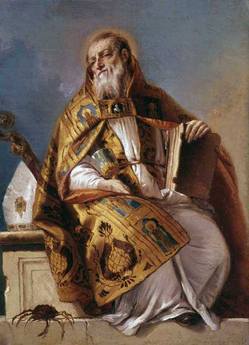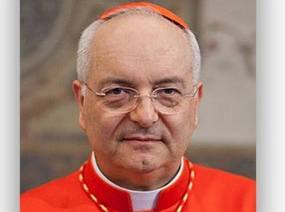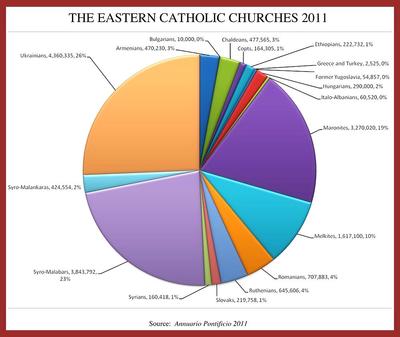
The Litany in honor of our holy father Saint Norbert
Lord, have mercy on us,
Christ, have mercy on us,
Lord, have mercy on us,
Christ, hear us,
Christ, graciously hear us,
God, the Father of Heaven, have mercy on us,
God, the Son, Redeemer of the world,
God, the Holy Spirit,
Holy Trinity, one God,
Holy Mary, pray for us,
Holy Mother of God,
Holy Virgin of virgins,
Queen of the White-robed Order,
Thou who had a great love for St. Norbert,
Holy Father Norbert, pray for us,
St. Norbert, whose birth was foretold from Heaven,
St. Norbert, who was marvellously converted by God,
St. Norbert, mirror of true penance,
St. Norbert, who did trample earthly pomps under foot,
St. Norbert, despiser of the world,
St. Norbert, who did conquer thy passions and affections,
St. Norbert, who did gain the victory over temptations,
St. Norbert, who did quell and cast down devils,
St. Norbert, restorer of peace and concord,
St. Norbert, who did walk barefoot,
St. Norbert, who did practise mortification,
St. Norbert, lover of the Cross,
St. Norbert, pattern of abstinence,
St. Norbert, most strict observer of fasting,
St. Norbert, who did yourself practice and teach silence,
St. Norbert, who did receive the white habit from the Mother of God,
St. Norbert, most constant in faith,
St. Norbert, most firm in hope,
St. Norbert, most fervent in charity,
St. Norbert, zealous lover of chastity,
St. Norbert, model of poverty,
St. Norbert, mirror of obedience,
St. Norbert, vigilant teacher of discipline,
St. Norbert, defender of the true faith,
St. Norbert, choice vindicator of the Blessed Sacrament,
St. Norbert, pillar of the Catholic Church,
St. Norbert, flower of sanctity and brightness of all virtue,
St. Norbert, light of prayer and contemplation,
St. Norbert, pattern of perfection,
St. Norbert, leader of the white-robed army,
St. Norbert, patriarch of the Premonstratensians,
St. Norbert, father and protector of thy Order,
St. Norbert, primate of Germany,
St. Norbert, worker of miracles,
St. Norbert, wonderful Discerner of spirits,
St. Norbert, imitator of Jesus Christ,
St. Norbert, follower of the Apostles,
St. Norbert, who was like to the Martyrs,
St. Norbert, gem of Pontiffs,
St. Norbert, Glory of Confessors,
St. Norbert, companion of virgins,
St. Norbert, colleague of all Saints,
St. Norbert, admirable in his translation,
Be merciful, spare us, O Lord,
Be merciful, graciously hear us, O Lord,
From the neglect of Thy commandments, deliver us, O Lord,
From the transgression of our vows,
From uncleanness of mind and body,
From the spirit of fornication,
From a proud and sad spirit,
From the snares of the devil,
From overwhelming temptation,
From the disorder of our passions,
From the blindness of self-love,
From the obstinacy of self-will,
From an evil and unprovided death,
Through the wonderful conversion of St. Norbert,
Through his austere penance,
Through his ardent zeal in preaching,
Through his exemplary life,
Through all his virtues,
Through his holy death,
Through his wonderful translation,
Through his glorious crown in Heaven,
Through his merits and intercession,
We sinners, beseech Thee, hear us,
That Thou would grant us true sorrow and contrition of heart, we beseech Thee, hear us,
That Thou would grant us a true conversion of life,
That Thou would grant us obedience to our Rule and preserve us in the same,
That Thou would make faith, hope and charity to grow in us,
That Thou would make us zealous observers of our three vows,
That Thou would grant us the gift of prayer,
That Thou would bestow upon us the seven gifts of the Holy Spirit,
That Thou would vouchsafe to govern and preserve Thy holy Church,
That Thou would vouchsafe to extend and preserve the Premonstratensian Order,
That Thou would vouchsafe to strengthen the Abbot General and all the Abbots of the Order with a perfect spirit,
That Thou would vouchsafe to grant us the crown of perseverance,
That Thou would give grace to the living and to the departed eternal rest,
Lamb of God, Who takes away the sins of the world, spare us, O Lord,
Lamb of God, Who takes away the sins of the world, have mercy on us.
Christ hear us,
Christ graciously hear us,
Lord have mercy on us,
Christ, have mercy on us,
Lord, have mercy on us,
(quietly) Our Father who art in heaven, hallowed be Thy name. Thy kingdom come, thy will be done on earth as it is in heaven. Give us this day our daily bread, and forgive us our trespasses as we forgive those who trespass against us …
V. And lead us not into temptation,
R. But deliver us from evil.
V. Pray for us, O Holy Father Norbert,
R. That we may be made worthy of the promises of Christ.
V. O Lord, hear my prayer,
R. And let my cry come unto Thee.
V. The Lord be with you,
R. And also with you.
Let us pray.
O God, Who did make of Blessed Norbert, Thy Confessor and Bishop, an excellent preacher of the Word, and by his means did enrich Thy Church with new offspring, grant, we beseech Thee, that through his intercession we may put in practice by Thy grace what he taught us, both in word and work.
Awake, O Lord, in Thy Church the Spirit by Whom St. Norbert, Thy Confessor and Bishop was guided, in order that, filled with the same spirit, we may love what he loved and live as he taught us.
O Lord, grant to us Thy servant’s constancy in Thy faith and service, that, rooted in Divine charity, we may not be conquered by any temptation. Through Christ Our Lord. Amen.
Praised be the Blessed Sacrament of the Altar and the Immaculate Conception of the Blessed Virgin Mary.
Praised be Jesus Christ. Amen








